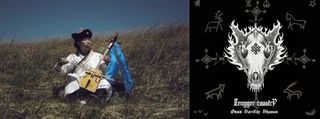There’s an idea in the arts – and especially music – that it’s all been done before. As rock ’n’ roll, punk and metal have evolved, morphing into all the many permutations that exist today, even amongst the most avant-garde noise makers, there’s nothing left to be invented. It’s all been done before.
Unless, of course, you’re Nature Ganganbaigal. Born and raised in Beijing, China and of Mongolian descent, he now lives in New York and, since 2009, has been channelling his heritage – and his early love of heavy metal – into some of the most unique music you’re likely to hear through his band, Tengger Cavalry. Named after the ancient Mongolian and Turkic deity Tengri, the band incorporate traditional Mongolian throat singing into a folk-metal hybrid that is unique. Initially started as a solo bedroom project, it took time for Ganganbaigal to take his music to the stage, but now, with new album Blood Sacrifice Shaman – a recorded and expanded version of a demo he made in 2010 – it seems he’s now ready to truly unleash Mongolian folk-metal on the rest of the world.
Why did you decide to expand and re-record Blood Sacrifice Shaman?
“It’s interesting. That was our first demo in China and it was really underground, and to be honest, I hate it. I still don’t want to listen to it, because it was recorded so shittily. I want to be a good producer so I don’t want to listen to it, but people keep telling me they really love the songwriting on it. I haven’t written anything new this year, so I have nothing new to give to my fans. We never released the Blood Sacrifice Shaman demo album in the Western world – we only pressed like 500 copies in China – so I thought ‘Let’s make this international!’ but on the condition that we re-orchestrate it and remake everything to make it sound professional, not like some underground black metal band! And I like it now. It’s incorporated some of my recent knowledge of composition, but also has the same song structure and basic harmony progression of the original record.”

When you listen to it now, do you recognise who you were when you wrote it, and do you still relate to that person?
“I feel like my life has changed a lot. I’m very into Mongolian culture, and I found out that, four generations ago, I am descended from Mongolian people. And so the way I see myself has changed a lot. I moved to America, too, and here people are more accepting of who you think you are than in China, where we have this Communism shit, you know? Like, ‘You’re Chinese – you can’t claim you’re Mongolian.’ So things have changed a lot, and when I re-recorded this album, I put more of my heart into it, compared to back at the time, when I initially made it in 2010, and it was more of an experiment in sound. This record means more to me, to have found who I am and what I am, and I think it goes deeper and deeper and people can tell from the music that it’s based on my life experience.”
**Obviously your identity is very important to you and your music, but how did you first get the idea to bring these two cultures – the Mongolian music and the metal – together? Because it’s not something that you think would necessarily work.
**“Firstly, as a Chinese kid, I grew up with heavy metal, because I hate all the Communist bullshit. I still hate it and I still don’t want to go back to China – not because I hate the country, but the culture. So I grew up listening to heavy metal, and then you grow up, you transform, and I went from angry kid to a kid that wanted to find something more peaceful. And then I encountered Mongolian music and it’s something that just touched my heart, like you don’t know the reason, you just love it. So I wanted to study Mongolian [horse] fiddle because it was something very different from heavy metal and not very aggressive. But this one day I heard an album by a Mongolian fiddle player, and he had some electric guitar and drum beats with the Mongolian fiddle and it set off this little spark in my brain. Like, why not put these two things I love together, because it might sound really bad-ass. And when it came out and people came back to me I just knew that it was working.”
And the Mongolian throat singing is kind of a variation on the death metal growl anyway, just with a lot history behind it. How did you learn it?
“The first time I heard it on an album I was blown away, and I told myself I was going to learn it. And then I started to find teachers. I actually learned the technique from a few Mongolian teachers who are masters of the technique. This kind of Mongolian throat singing is very skillful. You have to be very careful. I don’t recommend anybody to learn by themselves, because they might learn the wrong way. It’s very hard and it might damage your throat.”
Tengger Cavalry started out as a solo project, then you became a band, but the rest of the band are in China still. So is it back to being a solo thing?
“Well, to make it very clear, I fired all the Chinese members! [laughs] So for all the future gigs, it’s going to be my American members. I don’t have any association with the Chinese members now. Even when I was in China, I felt like they were not with me, and I needed people more interested in this band in a professional way. But now that I’m here it makes even more sense. And actually, I didn’t tell them that I fired them. I just said, ‘Hey guys, I’m going to have a bunch of new American guys’, but they’re all busy with their own lives so they should have understood what’s going on.”
You’re probably the only Mongolian folk-metal band in the world. What do think draws people to your music?
“Let me think…. I think firstly, the sound itself. I think most people just care about music first. People have told me that it just makes sense to them, and some of them didn’t even know it was Mongolian. They’d never heard about this culture and they don’t know about its horse fiddle but when they hear our music they can picture a warrior running around – so they can capture the culture in one second without needing to read any books. So I think that’s why a lot of people like it, because the music can help visualise the culture. But also, the metal structures ae super old school, because I grew up with all the old school bands. I don’t know how to write a riff like all these new deathcore bands or whatever!”
And what are your hopes for the band? Where do you see this going?
“I want to see this going two ways. First, I want to play as many of the big metal festivals as possible, but we also want to do these local small bar shows unplugged. And I think going both ways will show off the best of the band as much as possible.”
Blood Shaman Sacrifice is out now through Metal Hell. Tengger Cavalry will play an unplugged show at Weill Recital Hall at New York’s Carnegie Hall on December 24. For more information, visit their website.

